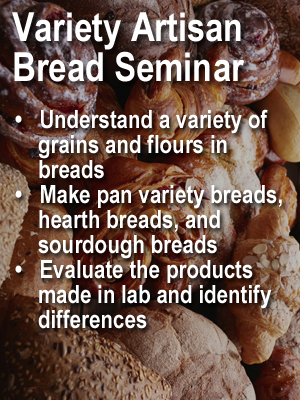How to Prevent Staling in Baked Goods
Question: I am a commercial baker and always seem to have issues in the warmer months of my products feeling stale by midday. I have been inundated with complaints recently and am becoming frustrated. Do you have some solutions you could offer me to alleviate the issue? Thank you.
What causes staling?
For a long time it was believed that staling was due to dehydration but now it has been clearly determined that the issue comes from “crystallization” of the flour starch. Crystallization is caused by water leaving starch granules and going into spaces in between granules. This process degelatinizes the starch and causes the starch amylose and amylopectin molecules to realign themselves causing recrystallization.
Emulsifiers in Food Products
Fortunately there is a family of additives called “emulsifiers” or dough softeners that can retard the rate of staling. Emulsifiers help prevent the water from migrating away from the starch molecules. You can learn more about emulsifiers online.
Common Emulsifiers
The two most common emulsifiers used in bread are the distilled monoglycerides and the datem esters. These additives don’t soften the bread itself or change any of the bread characteristics but would certainly help in keeping your product feeling fresh for a much longer time.
There are many different types of additives for dough. Check out our handy guide on Dough Additives to see the different types.
Ask us a Question!
Hope this helps you out! If you have any other questions please submit your question on our “Ask an Expert” page.
Staling of bread is a complex process that is mostly thought to be associated with retrogradation of starch to make the bread get firmer over time, although some researchers have also been able to show that protein and arabinoxylans play a role. Emulsifiers are typically used to complex with the starch to prevent it from retrograding and thereby slow the staling process. Different emulsifiers impact the staling process in different ways. Not all emulsifiers will keep bread softer for longer time. Typically mono and di glycerides and sodium stearoyl lactylate (SSL) are the common emulsifiers used by bakes to delay staling. The bread will still stale, but their use may delay it 3-5 days.
For even longer shelf-life extension, most bakers use a blend of enzymes to slow staling. The chief enzyme that is used is alpha amylase that breaks down the starch to make it into smaller fragments. There are many different sources of alpha amylase: fungal, cereal, maltogenic, and bacterial. Most crumb softening enzyme blends rely on a maltogenic amylase along with other enzymes such as hemicellulases or xylnases to delay crumb firming and staling.
I am a commercial baker I have got several complains from my clients that my get bread easily gets stale after adding enough emulsifier. I would like to know if there is any additive to stop my bread from get easily stale. If yes what is the name of the anti staling agent on the market?



